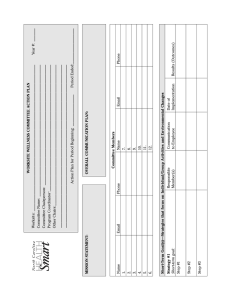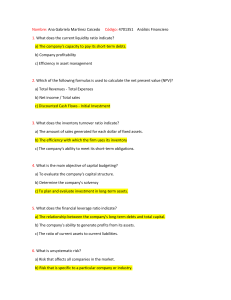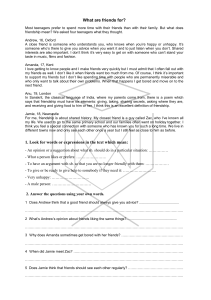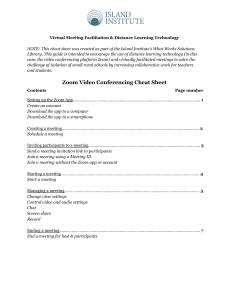Goal setting - Magellan Health
Anuncio
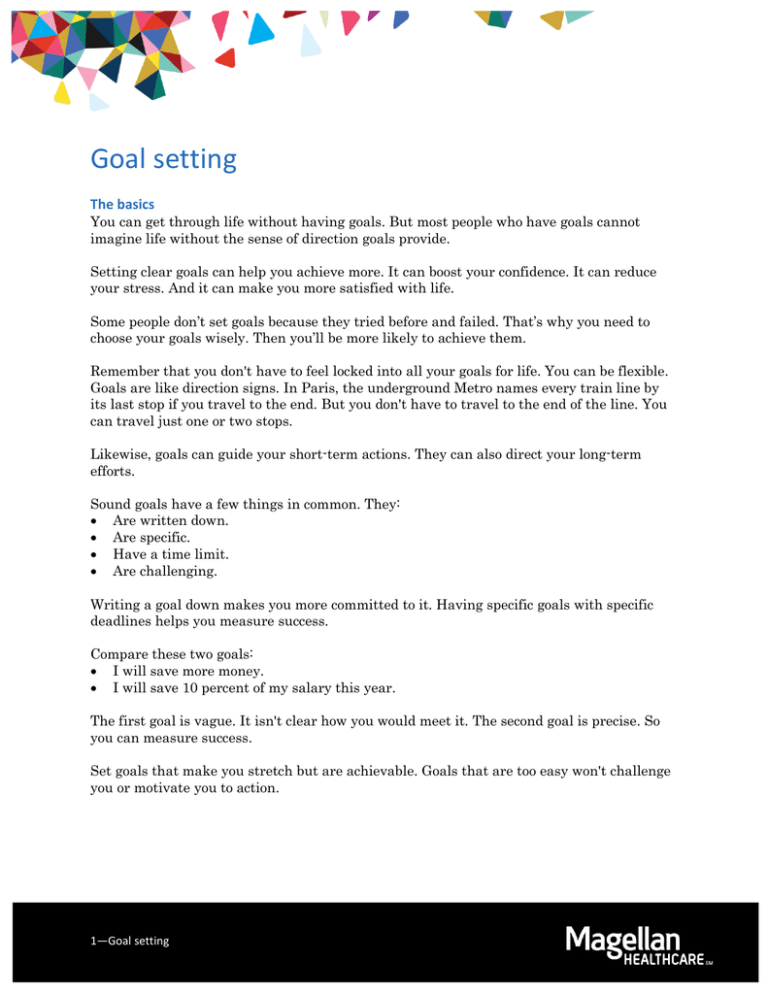
Goal setting The basics You can get through life without having goals. But most people who have goals cannot imagine life without the sense of direction goals provide. Setting clear goals can help you achieve more. It can boost your confidence. It can reduce your stress. And it can make you more satisfied with life. Some people don’t set goals because they tried before and failed. That’s why you need to choose your goals wisely. Then you’ll be more likely to achieve them. Remember that you don't have to feel locked into all your goals for life. You can be flexible. Goals are like direction signs. In Paris, the underground Metro names every train line by its last stop if you travel to the end. But you don't have to travel to the end of the line. You can travel just one or two stops. Likewise, goals can guide your short-term actions. They can also direct your long-term efforts. Sound goals have a few things in common. They: Are written down. Are specific. Have a time limit. Are challenging. Writing a goal down makes you more committed to it. Having specific goals with specific deadlines helps you measure success. Compare these two goals: I will save more money. I will save 10 percent of my salary this year. The first goal is vague. It isn't clear how you would meet it. The second goal is precise. So you can measure success. Set goals that make you stretch but are achievable. Goals that are too easy won't challenge you or motivate you to action. 1—Goal setting Tips for successful goal setting Tip 1: Think about what you would like to achieve during your life. These are your long-term goals. They will give an overall direction to your choices. Next, set smaller, short-term goals. These should support your long-term goals. They should move you toward your final goals. Remember that every goal must have a deadline. Goals without deadlines are just hopes. Tip 2: Set goals in terms of your own actions. Choose things you have control over. If your goal is to have a new job in three months, your success will depend on things such as the economy. So a better goal would be to update your resume and send it to 25 likely employers. That will take some work. But it's under your control. Tip 3: Don't make a big decision or choice without referring to your long-term goals. Take a few minutes to think about the possible outcomes of your choices. Weigh them against your goals. Decide what you want the most. Then make choices that take you in that direction. The specifics Organizing goals Goals can't stand alone. They must reflect a logical vision of the life you want to lead. Think seriously about how you want your life to go. Write a mission statement for your life. This should be a short description of what you hope to achieve before you die. Think about where you'd like to be in 20 years. Do the same for 10 years, five years and a year from now. Find the pattern in these goals. What do they have in common? How do they build upon one another? Review your goals on a regular basis. They need to reflect the changes in your life. People often change their priorities over time. This is part of the learning process. It does not imply that your old goals were worthless. Traits of solid goals A good goal is one you truly care about. It is not one that you think you should care about. It should not be something that the people around you think you should aim for. Your goals work on your mind and your motivation. It's important to state them positively. For example, you might want to avoid fights with your parents for the next month. Stated positively, the goal becomes having warm and friendly relations with your parents for the next 30 days. 2—Goal setting Make your goals as specific as you can. They then become measurable. That's how you define your success. Spelling out your goals in detail calls for more thinking on your part. It makes your goals more real. Goals should be something that you can visualize. Mental images of your own success will help motivate you when you face obstacles. Goals are great tools. But falling short of a goal doesn't mean you have failed. Your goal served a purpose if it helped you perform better than you would have otherwise. Don't get frustrated. Don’t give up goal setting altogether. Using your goals Let your goals guide your efforts. When you have a choice of what to work on next, consider your goals and pick a task that will bring you closer to one of them. If you are feeling frustrated, make sure your current actions are moving you toward your goals. If they are, focus on the goal as you keep working. If they aren't, you have a good reason to feel frustrated. See whether you can work more directly toward one of your goals. Pace yourself for the long haul. Many people start toward a goal with a big burst of energy. Then they get tired and quit. The better approach is to look at your goal as the finish line of a long race. Sprinting won't get you there. To reach your most important goals, you need a steady effort for a long time. Finally, if your goals seem unreachable, break them down into smaller, more achievable goals. This gives you the chance to celebrate small victories on your way to the final goal. Sharing your goals Telling someone else about your goals can increase your own commitment. It also provides a source of support for your efforts. Consider sharing your personal goals with your spouse or other family member. Think about sharing your professional goals with your boss or coworkers. FAQs I've established my goals. I’ve broken them down. And I am accomplishing tasks. But I'm not having any fun. It's not satisfying. In fact, I'm exhausted. What am I doing wrong? Are you sure your dream is your own? People often set goals that they think they should want. Or that their parents or partner want for them. Just because you come from a family of lawyers doesn't mean you can't be a marine biologist. Are you really looking forward to an early retirement? Or are you just giving into the desires of your spouse? You’ll soon find out that goals that are not your own weigh you down. Here's a quick way to find out if you're fooling yourself. Imagine you have reached your goal to be a lawyer. You're sitting in your big chair in your office at the family practice. What are you wearing? What are you doing? How do you feel? Are you happy? Resentful? Bored? If you're resentful and bored, the goal may not be right for you. Is there something else you could do that would make your family happy without going into law? 3—Goal setting My goals conflict with one another. And they're all important to me. How can I achieve them all? You may not be able to achieve them all at the same time. But there are ways to approach this situation. You can have goals that change over time. You can be a stay-at-home Mom while the kids are growing up. Then you can pursue your dream of owning a bed and breakfast. Work to achieve different goals in different parts of your life. Moonlighting is one way to achieve goals at the same time. You can also express one passion through your full-time job. Then you can pursue another goal through volunteer work or your hobbies. Finally, you can combine several interests or passions into one goal. Someone who loves medicine and travel but also wants to help the poor could become a missionaryphysician. Now that I've established my goals, how do I go about reaching them? You need a plan of action. Think of it as a road map for your life. Start with a single goal. Break it down into smaller, more short-term goals. Then divide those smaller goals into individual tasks. After that you should outline the steps you will take to complete each task. This process is simple and effective. It also helps you focus your thoughts and make daily decisions. Ask yourself, "What is the most important thing I could be doing right now?" or "Which of these choices would take me closer to my goal?" For more information More information, self-help tools and resources are available online. Go to www.MagellanHealth.com/Training. 4—Goal setting
